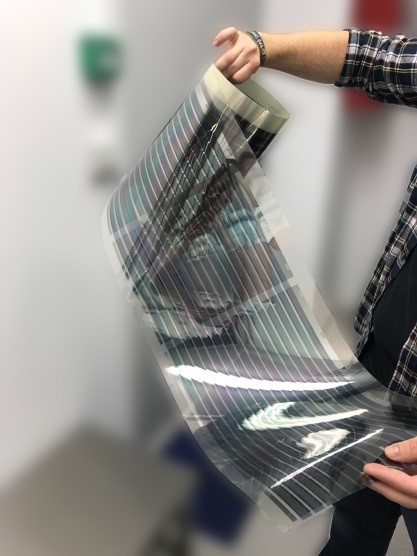Greek-based R&D team Organic Electronic Technologies (OET) reported a new efficiency record of 7.4% for a fully roll-to-roll (R2R), printed polymer-based, single junction organic photovoltaic (OPV) cell.
The result has been independently corroborated by Nanotechnology Lab LTFN, of the Aristotle University of Thessaloniki, using a simulation of AM 1.5 illumination under 1000 W/m².
In a joint international effort with EU projects including FP7, project smartonics, project gladiator, H2020 factory of the future, project smartline and H2020 cornet, OET has further optimized its nano-production methods.
The Thessaloniki-based company is aiming to achieve 9% efficiency in OPV cells by 2021. Starting at 1.8% efficiency, OET has already significantly improved performance and says it is on track to achieve its ambitious goal.
“This new result supports efforts for OPV panel mass production [of ] up to one million square meters annually, targeting various pilot demonstration projects in 2021,” said the company in a statement.
Customized, fully printed OPV panels up to a meter in length and in a variety of shapes, will ensure client-specific requirements can be launched from September. The flexible OPV cells can be attached to range of flat and curved surfaces, improving consumer products ranging from lighting, displays and surfaces to electronic circuits, bio sensors, wearables, IT and internet of things applications.
A team of researchers from the University of Osaka recently announed an AI based method of improving the efficiency yield of OPVs.
While organic PV technology has many potential applications, due its flexibility and the reduced use of rare metals, its low efficiency yield has inhibited large-scale commercialization.
This content is protected by copyright and may not be reused. If you want to cooperate with us and would like to reuse some of our content, please contact: editors@pv-magazine.com.




By submitting this form you agree to pv magazine using your data for the purposes of publishing your comment.
Your personal data will only be disclosed or otherwise transmitted to third parties for the purposes of spam filtering or if this is necessary for technical maintenance of the website. Any other transfer to third parties will not take place unless this is justified on the basis of applicable data protection regulations or if pv magazine is legally obliged to do so.
You may revoke this consent at any time with effect for the future, in which case your personal data will be deleted immediately. Otherwise, your data will be deleted if pv magazine has processed your request or the purpose of data storage is fulfilled.
Further information on data privacy can be found in our Data Protection Policy.